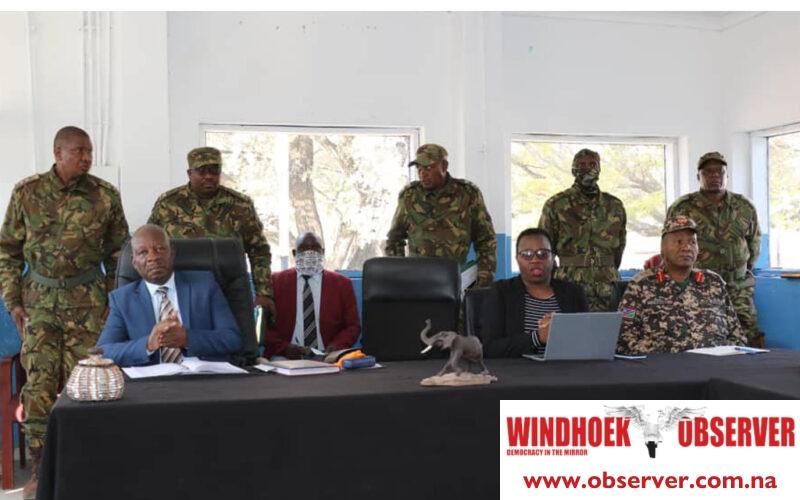Niël Terblanché
The joint civil-military community sensitisation campaign between Namibia and Botswana aimed at addressing critical issues such as illegal fishing, border crossings, poaching, and the smuggling of firearms, drugs, and illicit goods has commenced in the Zambezi region.
Launched in June in both countries, the campaign began on Impalila Island on the Namibian side of the border.
The initiative focuses on human-wildlife conflict, cattle rustling, and the protection of resources, with residents from Impalila Island and the nearby Kasika Island actively participating in the first community sensitisation meeting.
During the meeting where the campaign was launched, several issues affecting both sides of the border were raised.
Residents expressed concerns over the high cost of transportation by road and river, which significantly increases other prices.
Additionally, residents of Impalila, Kasika, and Mbalasinte highlighted the need to declare fish they intend to sell on the Botswana side, contrasting with the perceived freedom and welcome experienced by Batswana in Namibia.
They urged responsible agencies to help reduce the cost of sourcing goods and services, given Impalila’s easier accessibility from Botswana when compared to Namibia.
Issues regarding the differing treatment by law enforcement agencies between Namibia and Botswana were also discussed.
Colonel Modiri Thembo, responsible for future operations and Civil-Military Cooperation campaigns in the Botswana Defence Force (BDF), assured Namibians that the BDF operates within the law and that incidents involving the shooting of individuals suspected of illegal activities are not intentional.
Namibia’s Deputy Director for Protocol and Consular Affairs in the Ministry of International Relations and Cooperation, Mario Munwela, read a joint statement by the two countries while stressing that peaceful coexistence and good neighbourliness along the common border is critical for the campaign to succeed.
The joint team, consisting of all relevant ministries and agencies from Botswana and Namibia, will cover up to 23 villages in Namibia, with a similar team conducting campaigns in 21 villages in Botswana.
The Civil-Military Cooperation (CIMIC) Plan was launched in June to reinforce border security and combat illegal activities. The initial launch took place in Kasane, Botswana, followed by Katima Mulilo, Namibia.
The CIMIC initiative is a collaborative effort under the theme “Working Together to Ensure Peaceful Coexistence, Security, and Human Development.”
At the time, Namibia’s Minister of Defence and Veteran Affairs, Frans Kapofi, and Botswana’s Defence and Security Minister, Thomas Mmusi, both reiterated the deep historical ties and commitment to peace between the two nations.
Kapofi highlighted the importance of the CIMIC Plan in fostering peaceful coexistence and addressing various challenges along the border.
The CIMIC Plan, conceived by the Botswana-Namibia Bi-National Commission in 2022, calls for joint efforts by both countries’ defence forces to conduct coordinated patrols and community engagement activities along the border.
These activities will address illegal fishing, border crossings, poaching, and other criminal activities, often exacerbated by foreign nationals exploiting local hospitality.
Minister Mmusi at the time described the CIMIC Plan as a critical step towards fostering cooperation and ensuring the safety of citizens in both nations.
Members of the two defence forces will work together to conduct routine patrols along our shared border, which will not only enhance security.
The plan includes sensitisation campaigns targeting illegal border crossings, poaching, and human-wildlife conflict, set to begin in July and August.
A key aspect of the CIMIC Plan is its focus on community involvement.
In this regard, traditional leaders and community representatives from both countries have been enlisted to support the initiative, ensuring that local voices are heard and incorporated into the planning and implementation stages.
This inclusive approach aims to foster a sense of ownership and responsibility among border communities, enhancing the plan’s effectiveness.
The launch of the CIMIC Plan’s sensitisation campaigns demonstrates a collective commitment to peace, security, and human development.




